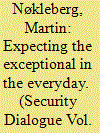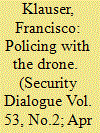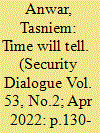|
|
|
Sort Order |
|
|
|
Items / Page
|
|
|
|
|
|
|
| Srl | Item |
| 1 |
ID:
185184


|
|
|
|
|
| Summary/Abstract |
There has been considerable scholarly interest regarding the notion of exceptionality, i.e. how and under what conditions extraordinary powers and measures are justified in the name of security. Exceptional threats are now omnipresent in the security discourse of the aviation and maritime industries, and this influences the everyday working environment. Taking Norwegian airport and port security as its point of departure, this article analyzes how security and policing agencies perceive, experience, and respond to the exceptional as part of their everyday practice. Drawing on extensive interview material with security agencies, it reveals how agencies construct strategies to cope with the consequences of exceptionality that arise from heightened (in)security and vulnerability. This article demonstrates that instrumental logic in risk management is one crucial strategy, but evidence also reveals the importance of the human dimension in security practices, as the emotional aspect of security consciousness is a part of the everyday life of security agencies. Closely associated with this is the emergence of mechanisms of active resistance that provide excitement and alleviate boredom.
|
|
|
|
|
|
|
|
|
|
|
|
|
|
|
|
| 2 |
ID:
185181


|
|
|
|
|
| Summary/Abstract |
In the context of the fight against Islamist radicalization in France, prison intelligence rapidly developed from 2015 through the gradual creation of a dedicated service and a specific corps of professionals. This professionalization of prison intelligence work has deeply transformed the prison administration. This article aims to describe and analyse these transformations on the basis of an ethnographic study conducted in radicalization assessment units, which are specific units set up to assess prisoners who have committed or are suspected of committing crimes linked to radical Islam. We shall describe how the guards, probation officers, psychologists and educators participating in assessing the prisoners adapt to the new, encroaching presence of the intelligence mission. We shall analyse the forms of collaboration and competition between this staff and the prison intelligence officers. Lastly, we will examine criticism of the intelligence activity in the radicalization assessment units voiced by various professionals. The interpenetration of the assessment work and the intelligence mission – which are formally distinct missions – produces a specific type of knowledge relating to radicalized prisoners: a reproduction of certain representations or ‘profiles’.
|
|
|
|
|
|
|
|
|
|
|
|
|
|
|
|
| 3 |
ID:
185180


|
|
|
|
|
| Summary/Abstract |
Critical prison studies have demonstrated how states use imprisonment and detention not only to punish individuals, but also to quell dissent and disrupt opposition movements. In protracted conflicts, however, the use of mass incarceration and unlawful detention often backfires on states as politically motivated prisoners exert their relevance by making imprisonment itself a central issue in the wider conflicts. Rather than retreating to the margins, prisoners have taken back prison spaces as loci of resistance, forcing both state authorities and their own external parties to engage with them seriously as political actors. This subversion of the prison space is not automatic, however; as this article demonstrates, prisoners have exerted the most influence on both authorities and their own factions when they have combined pragmatism and radicalism through multilevel strategies such as establishing praxes for self-education and organizing; using everyday non-compliance to challenge prison administrators; and occasionally, engaging in hunger strikes that exert boomerang pressure from external factions and solidarity networks on state authorities. Drawing from the case studies of Israel–Palestine, Northern Ireland and South Africa, this research shows how these radically pragmatic tactics create a ‘trialectic’ interaction between prisoners, state authorities and external networks, forcing direct and indirect negotiations regarding prisoners’ rights, and, at times, influencing broader conflict dynamics.
|
|
|
|
|
|
|
|
|
|
|
|
|
|
|
|
| 4 |
ID:
185183


|
|
|
|
|
| Summary/Abstract |
This article explores in empirical detail the air-bound expectations, imaginations and practices arising from the acquisition of a new police drone in the Swiss canton of Neuchâtel. The study shows how drones are transforming the ways in which the aerial realm is lived as a context, object and perspective of policing. This tripartite structure is taken as a prism through which to advance novel understandings of the simultaneously elemental and affective, sensory, cognitive and practical dimensions of the aerial volumes within, on and through which drones act. The study of the ways in which these differing dimensions are bound together in how the police think about drones and what they do with them enables the development of an ‘aerial geopolitics of security’ that, from a security viewpoint, approaches interactions between power and space in a three-dimensional and cross-ontological way.
|
|
|
|
|
|
|
|
|
|
|
|
|
|
|
|
| 5 |
ID:
185182


|
|
|
|
|
| Summary/Abstract |
Calculating the potential risk of future terrorist violence is at the core of counter-terrorism practices. Particularly in court cases, this potential risk serves as legitimization for the preemptive criminalization of suspicious (financial) behaviour. This article argues that the preemptive temporality seen in such court cases is a practice of ‘sorting time’ and producing distinct legal definitions around future violence. Building on postcolonial and feminist scholarship on temporality, the article examines preemptive temporality as the material, embodied and multiple engagements with time that are enacted in terrorism court cases. Through the use of empirical data obtained from court observations, court judgements and interviews with legal practitioners, accounts of empirical temporalities are traced to illuminate other forms of violence that until now have been overshadowed by the dominant (and relatively unchallenged) perception of future terrorist threats that is enacted in the courtroom. In this way, the article makes two important contributions. First, it advances the theoretical debate on preemptive security through an examination of how legal and security practices co-produce temporality by defining future terrorist violence. Second, it contributes empirically by showing how temporality is constructed in multiple ways, paying specific attention to temporalities resisting dominating perceptions of future terrorist violence.
|
|
|
|
|
|
|
|
|
|
|
|
|
|
|
|
|
|
|
|
|